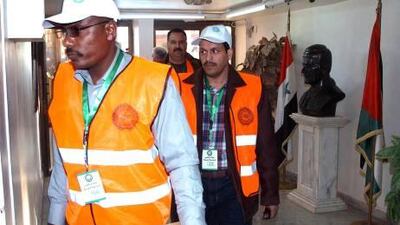DAMASCUS // At least 32 people were killed by security forces across Syria yesterday, activists said, as tens of thousands demonstrated for the first Friday protests since the deployment of Arab League monitors.
Opposition groups reported members of the league's observer group in Harasta and Douma, areas on the outskirts of northern Damascus that have played a persistent role in the uprising.
In Harasta protesters held up olive branches while in Douma rights activists staged a sit-in, with footage aired on Al Jazeera showing them being addressed in a mosque by one of the monitors.
"Our goal is to observe ... it is not to remove the president, our aim is to return Syria to peace and security," the monitor said, before adding, "from what I have heard there is blood being shed".
Activists had called for mass gatherings after Friday prayers - a traditional time for demonstrations - to prove to the observers that the uprising was still underway and still being brutally suppressed by security forces, despite an Arab League plan agreed with Syria to end 10 months of violence.
Protesters answered that call with demonstrations taking place in the areas that have become synonymous with the uprising, among them Homs, Hama, Idlib, Deraa, Deir Ezzor and the Midan and Hajar Aswad neighbourhoods of Damascus.
There were also protests in places less commonly thought of as being involved in the uprising, such as Raqqa, Palmyria and the upmarket Mezze district of the capital.
The presence of the league's monitors, who carried out their first inspection mission to Homs on Tuesday, has done nothing to stop the bloodshed with dozens killed since then. More than 5,000 have been killed since March, the United Nations says.
Yesterday the Local Coordination Committees (LCC), a network of dissidents that tracks demonstrations nationwide put the day's death toll at 32 by late afternoon.
The LCC said security forces using live ammunition had killed nine people in Hama, six in the city of Deraa, four in Tal Kalakh, five in Homs, six in Idlib and one in each of the southern Damascus suburbs of Daraya and Moadamiyeh.
In Douma, the Syrian Observatory for Human Rights said, dozens were wounded when nail bombs were fired into the crowd.
Syrian officials reject the death tolls given by human rights groups and the UN. State-run media yesterday mentioned one casualty, a man injured by unknown gunmen in the north-eastern city of Qamishli.
Sana, the official news agency, also made no reference to protests but did report "massive spontaneous gatherings" supporting President Bashar Al Assad in Damascus, Aleppo, Homs, Latakia, Tartous, Sweida and Hasika.
It also said security forces defused two bombs in Hama, and that other explosives detonated in Deir Ezzor, in Aleppo province and in Hama, none causing any casualties.
The claims of activists and the authorities could not be independently verified.
Syrian officials say they are battling foreign-backed Islamist insurgents and are complying with an Arab League deal to free thousands of political prisoners, pull tanks out of urban centres and cease violence. Opposition groups, and leading international rights monitors, including the UN human rights council, say the regime is violently putting down a largely peaceful call for greater civil rights.
Also yesterday, the Free Syrian Army announced it would stop offensive operations against loyalist forces, and wanted to meet League observers, although it remains unclear how many of those taking up arms against the regime actually follow orders given by the FSA's exiled leadership.
Meanwhile, on Thursday the International Committee of the Red Cross (ICRC) warned that conditions in Syria had continued to deteriorate with fuel and food shortages mounting, and on-going concerns about the wounded being denied medical treatment.
"There have been repeated reports of lack of respect for medical staff and facilities," Béatrice Mégevand-Roggo, the ICRC's head of operations for the Near and Middle East, said.
The ICRC has distributed emergency food aid to 85,000 people in crisis-hit areas.

